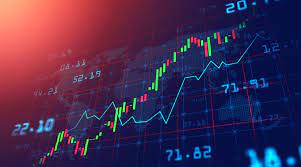
The Evolution of Online Trading: Navigating a Post-Pandemic Financial Landscape
Online trading has experienced a remarkable evolution, accelerated by the global pandemic’s impact on financial markets. The trading landscape has changed significantly in response to the crisis, reshaping the way traders engage with stocks, cryptocurrencies, and other assets.
Shift to Digital Trading Platforms
The pandemic accelerated the transition from traditional trading methods to digital platforms. With the closure of physical trading floors and the shift to remote work, more traders turned to online trading platforms. This migration to digital tools is likely to persist as they offer accessibility, convenience, and robust features.
Increased Retail Trading Activity
The lockdowns and increased free time during the pandemic led to a surge in retail trading activity. A new generation of traders emerged, often referred to as “retail investors,” who flocked to commission-free trading apps and platforms. These traders, many of them millennials, played a significant role in shaping the trading landscape.
Volatility and the Rise of Day Trading
The pandemic-induced market volatility provided opportunities for day traders. These short-term traders sought to capitalize on the fast-moving markets and fluctuations, often taking advantage of leveraged products and derivative instruments.
Rise of Cryptocurrencies
Digital currencies, particularly Bitcoin and Ethereum, experienced a surge in popularity during the pandemic. Cryptocurrencies became an attractive asset class, not only for investment but also as a hedge against traditional financial instability.
Challenges and Considerations
The changes in the trading landscape also brought about challenges. Increased retail trading led to concerns about market stability and the potential for stock market manipulation. Regulators have been actively monitoring these developments and considering new regulations to address market integrity.
Additionally, traders should be mindful of the risks associated with online trading, including the potential for losses, especially with highly volatile assets like cryptocurrencies.
The Future of Online Trading
The future of online trading is likely to be characterized by a blend of traditional and digital methods. While online platforms will continue to dominate, the use of artificial intelligence and machine learning for trading strategies is expected to increase. Additionally, regulatory frameworks will likely evolve to address the changing landscape and provide investor protection.
In conclusion, the pandemic has acted as a catalyst for significant changes in the online trading landscape. The increase in digital trading platforms, the rise of retail investors, the popularity of cryptocurrencies, and heightened market volatility are all contributing to this evolution. As online trading continues to transform, traders and investors must remain adaptable, informed, and aware of the opportunities and challenges presented in this new era of finance.